Professional backgrounds for CFOs
Nearly all professionals are, somehow, defined by their initial career path. We’re sponges at the end of the day, the sponge tends to absorb a lot more in youth and those behaviours become a part of who we are professionally. So you could be interviewing a CFO who’s an accountant by training, another with an investment background and another who started out as a consultant – and wondering to yourself why they are so different?
In the end, the Accountants will tend to hold more dearly the principles of transparency and warranting the one-truth can sometimes lean towards historical reporting. That’s not to say that many of those with this background are not amazing operators with a strategic vision on the future of the business. By comparison, Investment Bankers and Consultants spent a good deal more time early in their careers working to ‘win a pitch’ and will have a skill set with a more of a leaning towards storytelling and what it takes to get things over the line.
Assuming you have a former Banker or Consultant in the mix for your hire, it would be wise to be sure that they got their finance stripes in a previous or recent role. You don’t want to end up having to allow them the time to educate themselves on finance processes, reporting and compliance matters. For a CFO role it is reasonable to accept that they should come with those things all fully baked and be able to evidence that, when they have a team of accountants beneath them, they can genuinely lead on many of those topics even when fairly technical.
What is clear is that the CFO needs to be demonstrating skills across a spectrum. On one end they need to be on top of some of the mechanics of running the finance department and the other side they’d ideally be a storyteller who can effortlessly deputize for the CEO with investors. And, don’t forget, there is a good deal more that person needs to bring between these two extremes of the competencies spectrum.
CFO competencies
You’d ideally find someone who clearly scores highly across the whole of the CFO competency remit. However, it’s unlikely that any candidate offers similar scores across the board and so you need to focus on the area of greatest value that you expect in this role.
When you go through these exercises the topics that get thrown around tend to be IPO, Exit, Fundraising and operations and strategy. So if you’d picked IPO off that list there are a few myths to bust. To start off there is no evidence that IPOs can only be delivered by CFOs who have previously done an IPO. Secondly, the key sensitivity for a CFO taking on the IPO is the degree to which their lifestyle will accommodate taking on a massive technical project which culminates in many years of onerous public communications with the city. The CFO for an IPO is a rare beast, so much so that if you have not set your sights on a listing just assume a hardworking CFO with a good work ethic will figure it out. Beyond that, you’re overthinking the challenge and choosing to unnecessarily narrow down the candidate market.
Moving on to fundraising and Exit, which we’ll treat as a trade sale or an exit to PE for this section. The good news is that the competencies to perform in these two activities are the same. There is barely a hair’s width between them. It’s only the sanction for dropping the ball that differs. In the case of a fundraise another term sheet will come along in a few months if your business has appealing investment fundamentals. In the case of acquirers that is somewhat different, if your buyer loses interest you might have to wait a few years for them, or another player, to come around again.
So the skills for these activities are typically knowing the business inside-out, and being the curious type that figures that stuff out, being diligent on the details in DD, knowing how to spot the crown jewels vs the items that are less desirable to discuss and weave everything into the story of the future of the business.
In many respects, we’d expect Operations and Strategy to be executed well by those scoring high on the attributes associated with funding rounds, attention to detail, the ability to shape metrics around a core narrative that underpins the business strategy. However, the reality of operational aspects is that there are many more stakeholders to be managed in the process of guiding a business to a particular outcome. Great operators will bring persuasive skills to their relationships to those in Sales and Customer Support, whilst retaining the ability to ensure the organisation feels the weight of their targets.
Then finally building the team. This tends to be the area where many years of experience pays off in understanding the nuances of what a controller is capable of doing and what things would not be great to drop onto a financial analyst. It helps to be interested in people in this respect, however in the main great finance teams are built by people who have played a role in building teams during their career progression.
Career potential considerations
The one area that is sometimes overlooked is the question of what is the optimal potential for this person. There is a huge difference between the motivation of the person seeking to build and run a wonderfully professional finance team vs the one who could take on a leadership mantle a few years later, if that person sought to transition to Chairman or even CEO in the future.
This question is rarely asked in CFO interviews, and yet we know the most driven succeed. So be prepared to discuss what the individual seeks to achieve and share openly the full potential of the role if it could be bigger than the role that exists on day one.
Pitfalls
There are quite a few reasons a CFO hire might not work out, although no more for any other C-Suite role. We’ll flag four commonly observed pitfalls that could well come up in any process, the perennial controller, the charismatic, the expert interviewer and the dangers of chasing desirables with all the badges.
During most financial careers at some point, the individual will be the financial controller, they will report and consolidate, oversee controls and occasionally refuse to pay an invoice or expense claim when processes are not followed. This is a part of developing financial leadership, however by the time they are CFO, this area needs to be fettered. There is no other way to allow the broader skills to develop and really build close working relationships across the organisation. These candidates will tend to give themselves away in interviews, any candidate really keen to place too much emphasis on success through their controls and reporting layers may well have lodged in their controller role, even if other employers have given them Finance Director or CFO job titles in the past.
The charismatic will also give themselves away, often in a manner that appears to be the opposite of the perennial controller. They will be utterly charming, they’ll remember the names of your kids and will have interests that seem to be remarkably close to your own. With the charismatic, through the interview process you need to get to the essence of what they did, why, what the outcome was and then go a step further and pick away at the intricate details of their involvement. The charismatic in a finance role is nearly always compensating, and very often for not being good at the details. As we’ve already discussed, an eye for the details is a big part of funding, exits and generally building credibility as a CFO. If you speak to equity analysts, who hold CFOs of public companies to account, they’ll tell you they want a CFO who’s straight down the middle and is familiar with all the details of the business. If the CFO is anywhere near as charismatic as the CEO those same analysts are often alarmed.
The expert interviewee is a candidate that is forever looking for the next role and gets way too much practice answering interview questions. They end up with solid responses, flat energy and endure a process showing few nerves. These candidates are hard to interview as they are getting more practice in this type of thing than you are. Move them along to the work-study as soon as you can, it’s probably the only way to really read if they have the talent and can draw upon the necessary experience effectively for the role you have.
The last point is not regarding classification for candidates, it’s a challenge in setting your goals in the hiring process. If you have a highly desirable candidate in your sights you need to ask yourself ‘is what I have on offer really a thing they’d rationally seek to have?’. You might have the desire to have a $300m exit for your Tech business, so you seek someone who’s achieved that before. Now by definition, you’re asking for two things, you want someone with a few mil in the bank to come and work for you and you’re asking them to repeat something they’ve done before.
That just might not be a reasonable outcome to expect of that person. Better to accept there are too few candidates like that and you probably couldn’t seduce them into a rerun anyhow. Instead, invest in the selection process and hire for capabilities rather than past outcomes. Highly capable people excited by delivering on exciting plans could well be the optimal choice.
A few words on dealmakers
When bringing in a CFO a little later in the life of a company it’s easy to place a good deal of emphasis on their track record for deals. After all, an Exit or an IPO is really just a deal to change the ownership structure of the business. The good news here is those candidates with time spent in Investment Banking will have lots of tales of the deals they have been involved in. There is just one factor, however. That will have been one of many plates they had spinning in any given year, and completing a deal for a client is a completely different thing from a CFO delivering on an exit in their one business. The former is essentially hedged, the latter is landing the one deal and that could be the one time that opportunity comes up.
When discussing deals with any CFO, with either professional background, the focus should be on everything it took to ensure the fish doesn’t drop off the hook. Those are rarely glamorous activities, but are very detailed, time-consuming and are normally delivered at pace and through long working days. The one common truth is that ‘a failure to maintain high speed kills deals’.
Beyond the interview
It’s quite well understood that interview processes have substantial deficiencies. So in any CFO hiring process, you need to move to a work-study process fairly early in the process and really commit to that.
And those are things you cannot reasonably expect to buy off the shelf. Earlier in this article, we talked about fundraising, exit and strategic considerations. If you expect your CFO to major in these areas then build a work-study around them and have the prospective CFO deliver on that exercise under time constraints.
To give a practical example of a work-study. A board pack or pitch deck can be reworked with the financial elements absent from the slides and the candidate can be left with the metrics and accounts for a few hours and left to fashion a pitch and supporting numeric slides. These are tough exercises however you need candidates to pitch to all their stakeholders, the CEO, wider C-Suite and investors. And you need to see their authentic selves, problem-solving on-the-fly and a long way away from any kind of rehearsed presentation materials.
References
Just a few words on references. Even truly sub-standard candidates have great references – that may seem hard to believe but they do. As referencing is a social exchange and the reference providers stand neither to benefit personally nor to be held to account. So de-weight the reference elements, particularly if they come to you before you’ve asked about them. Lean more on the elements you have witnessed yourself in the selection process.
Close correlations and getting to know each other
The final aspect of this piece reflects on things I learned as the candidate at one stage in my career and the one supporting other C-suite hiring managers later in my career.
It’s not too hard, typically, to unpick interview notes and break them down to the five top things that person believes they have delivered in their most recent role. These will be the things that come up in examples in interview questions, and also the comparators suggested when answering the why’s in a work-study assessment.
You can then compare these top five things recently delivered, with the top five things you seek this person to deliver to you in the role they would be going into. This approach cuts through the chaff, as most job descriptions attempt to be overly exhaustive descriptions in what the role involves. This process will help you to form a view on suitability for the role. Most careers build on the blocks of past roles and you’d ideally be able to see a pattern where many of the big things in the candidate’s recent past are strong reflections of their prospective future in your role.
This article is written by Guy Hutchinson, founder of Startup CFO.
Guy Hutchinson had a fifteen-year career in VC backed Tech Startups, working with portfolio businesses backed by the likes of Accel, IAC and Octopus Ventures. He founded and runs Startup CFO, the leading community for Tech CFOs. They offer a series of programmes in this space including Exit Masterclass, IPO readiness, Mastermind Coaching and have launched their CFO recruitment services in the spring of 2023





